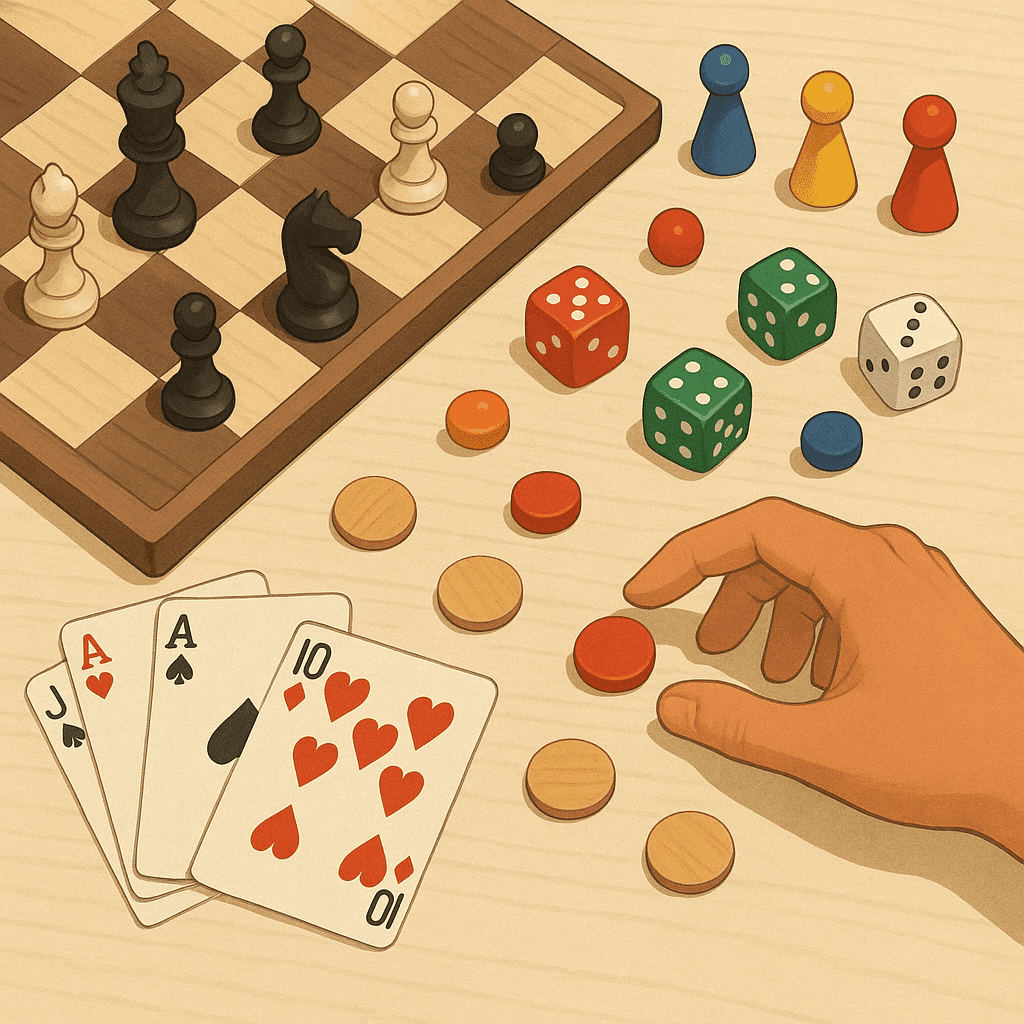
Strategy vs. Luck - The Eternal Debate in Board Games
Every board game sits somewhere between skill and chance. Some reward sharp minds and careful planning, while others rely on the roll of a die or the shuffle of a deck. But what truly makes a game strategic — and how much luck is too much? Let’s explore how these two forces shape the experience of play.
Created By Adam Davis Fernsby
What makes a game strategic?
Strategy-based games reward long-term planning and critical thinking. Players must make decisions that affect later outcomes, predict opponents’ moves, and adapt to changing situations. In games like Chess or Go, every move is deliberate, and success depends entirely on skill and experience. Even modern strategy titles like Catan mix tactics and negotiation, forcing players to weigh risks and anticipate others’ choices.
Strategic depth often comes from:
- Decisions that have lasting consequences
- Limited information or resources
- Predictable mechanics that reward planning
- Opportunities for counterplay and adaptation
The satisfaction of outthinking an opponent makes strategy-driven games endlessly replayable.
The role of luck and randomness
Luck introduces unpredictability - and excitement. Dice rolls, shuffled cards, and random events can turn the tide of a match in an instant. Games like Monopoly, Yahtzee, and Ludo thrive on this tension, making every round different and accessible for players of all levels.
Common ways luck appears in games:
- Dice rolls: introduce chance in movement or combat outcomes
- Card draws: ensure varied combinations and evolving tactics
- Random events: create unexpected challenges or opportunities
While luck can frustrate those seeking control, it also prevents games from becoming too predictable and ensures that even beginners have a chance to win.
Finding the balance - when skill meets chance
The best board games strike a balance between these two elements. Designers often include just enough randomness to keep outcomes uncertain, while still rewarding thoughtful play. This balance makes games feel fair, exciting, and worth revisiting.
Catan, for instance, relies on dice for resource generation but demands strategic placement and trading. Risk uses dice battles to resolve conflict but rewards long-term planning and alliances. The tension between predictability and surprise is what keeps players engaged.
Skill-based games that still involve luck
Even the most tactical games contain some element of luck. Poker depends on probability and psychology, but the initial deal is random. Backgammon combines calculated moves with the roll of two dice, forcing players to adapt strategy based on luck. Risk relies on tactical positioning, yet each attack depends on chance.
These examples show that luck doesn’t undermine skill - it amplifies it. A skilled player knows how to minimize randomness and capitalize on good fortune when it appears.
Why we need both
A world of pure strategy would feel rigid; a world of pure luck would feel meaningless. The magic lies in the mix. Luck levels the playing field, letting newcomers compete with veterans. Strategy keeps experienced players coming back, eager to refine their tactics.
Together, they make games thrilling, social, and endlessly varied - the very reason board and card games remain timeless.
Final thoughts
In the end, no board game is entirely skill or chance. Every roll, move, or card draw is part of a delicate balance that keeps us engaged and entertained. Whether you prefer mastering Chess or leaving fate to the dice in Yahtzee, both paths lead to the same goal - the joy of play.